- Home
- Haruki Murakami
Hard-Boiled Wonderland and the End of the World Page 3
Hard-Boiled Wonderland and the End of the World Read online
Page 3
“There’s a river in there,” she appeared to say. The sound of the water made it seem as if her speaking were simply drowned out. Somehow I found myself understanding what she was saying. Odd.
“Up toward the headwaters, there’s a big waterfall which you pass right under. Beyond that’s Grandfather’s laboratory. You’ll find out everything once you get there.”
“Once I get there? Your grandfather’s waiting for me?”
“That’s right,” she said, handing me a large waterproof flashlight with a strap. Stepping into total blackness wasn’t my idea of fun, but I toughened up my nerve and planted one foot inside the gaping hole. I crouched forward to duck head and shoulders through, coaxing my other foot along. With all the bulky rain gear, this proved no mean effort. I turned and looked back though my goggles at the chubby woman standing inside the closet. She was awfully cute.
“Be careful. You mustn’t stray from the river or go down a side path,” she cautioned, stooping down to peer at me.
“Straight ahead, waterfall?” I shouted.
“Straight ahead, waterfall,” she repeated.
As an experiment, I mouthed the word “sela.” This brought a smile and a “sela” from her, before she slammed the wall panel shut.
All at once I was plunged into darkness, literally, without a single pinprick of light. I couldn’t see a thing. I couldn’t even make out my hand raised up to my face. I stood there dumbfounded, as if I’d been hit by a blunt object, overcome by the chilling realization of my utter helplessness. I was a leftover wrapped in black plastic and shoved into the cooler. For an instant, my body went limp.
I felt for the flashlight switch and sent a welcome beam of light straight out across nowhere. I trained the light on my feet, then slowly took my bearings. I was standing on a three-meter-square concrete platform jutting out over bottomless nothingness. No railing, no enclosure. Wish she’d told me about this, I huffed, just a tad upset.
An aluminum ladder was propped against the side of the platform, offering a way down. I strapped the flashlight diagonally across my chest, and began my descent, one slippery rung at a time. The lower I got, the louder and more distinct the sound of water became. What was going on here? A closet in an office building with a river chasm at the bottom? And smack in the middle of Tokyo!
The more I thought about it, the more disturbed I got. First that eerie elevator, then that woman who spoke without ever saying anything, now this leisurely jaunt. Maybe I should have turned down the job and gone home. But no, here I was, descending into the abyss. And for what? Professional pride? Or was it the chubby woman in the pink suit? Okay, I confess: she’d gotten to me, and now I had to go through with this nonsense.
Twenty rungs down the ladder I stopped to catch my breath, then continued another eighteen rungs to the ground. At the bottom, I cautiously shined my light over the level stone slab beneath my feet and discovered the river ahead. The surface of the water rippled in the flashlight beam. The current was swift, but I could get no sense of the depth or even the color of the water. All I could tell was that it flowed from left to right.
Pouring light into the ground at my feet, I slowly made my way upstream. Now and again I could swear something was moving nearby, but I saw nothing. Only the vertical hewn-rock walls to either side of the river. I was probably anxious from the darkness.
After five or six minutes of walking, the ceiling dropped low—or so it seemed from the echo. I pointed my flashlight beam up but could not discern anything above me. Next, just as the woman had warned, I saw what seemed to be tunnels branching off to either side. They weren’t so much side paths as fissures in the rock face, from which trickled veins of water that fed into the river. I walked over and shined my flashlight into one of the cracks. A black hole that got bigger, much bigger, further in. Very inviting.
Gripping the flashlight tightly in my right hand, I hurried upstream like a fish mid-evolution. The stone slab was wet, so I had to step carefully. If I slipped now or broke my flashlight, that’d be it.
All my attention was on my feet. When I happened to glance up, I saw a light closing in, a mere seven or eight meters away. I immediately switched off the flashlight. I reached into the slicker for my knife and got the blade open, the darkness and the roar of the water making a perfect cover.
The instant I switched off my flashlight, the yellowish beacon riveted to a pinpoint stop. It then swung around in an arc to describe two large circles in the air. This seemed to be a signal: “Everything all right—not to worry.” Nonetheless, I stood poised on guard and waited for them to move. Presently, the light began to come toward me, waving through empty space like a giant glowbug coupled to a higher brain. I stared at it, right hand clutching the knife, left hand on the switched-off flashlight.
The light stopped its advance scarcely three meters from me. It motioned upward and downward. It was weak. I eventually realized it was trying to illuminate a face. The face of a man wearing the same crazy goggles and slicker as I had on. In his hand was the light, a small lantern like the kind they sell in camping supply shops. He was yelling to me over the noise of the water, but I couldn’t hear him; and because it was too dark, I couldn’t read his lips.
“… ing except that … time. Or you’d … in that regard, since …,” the man appeared to be saying. Indecipherable. But he seemed to pose no threat, so I turned my flashlight back on and shined it on my face, touching a finger to my ear to signal that I could barely hear him.
The man nodded several times, then he set down his lantern and fumbled with both hands in his pockets. Suddenly, the roar subsided from all around me, like a tide receding. I thought I was passing out. Expecting unconsciousness—though why I should be passing out, I had no idea—I braced myself for a fall.
Seconds passed. I was still standing. In fact, I felt just fine. The noise of the water, however, had faded.
“I came t’meet you,” the man said. Perfectly clear.
I shook my head, tucked the flashlight under my arm, folding the knife and pocketing it. Going to be one of those days, I could just tell.
“What happened to the sound?” I asked the man.
“Oh yes, the sound. It was loud, wasn’t it? I turned it down. Sorry about that. It’s all right now,” said the man, nodding repeatedly. The roar of the river was now the babble of a brook. “Well then, shall we?” he said with an abrupt about-face, then began walking back upstream with surefooted ease. I followed, shining my flashlight in his steps.
“You turned the sound down? Then it’s artificial, I take it?”
“Not at all,” the man said. “That’s natural sound, that is.”
“But how do you turn down natural sound?” I asked.
“Strictly speaking, I don’t turn it down,” the man replied. “I take it out.”
Well, I guess, if he said so. I kept walking, saying nothing. Everything was very peaceful now, thanks to his softening the sound of the water. I could even hear the squish-squish of my rubber boots. From overhead there came a weird grinding as if someone were rubbing pebbles together. Twice, three times, then it stopped.
“I found signs that those INKlings were sneakin’ in here. I got worried, so I came t’fetch you. By rights INKlings shouldn’t ever make it this far in, but sometimes these things happen. A real problem,” the man said.
“INKlings?” I said.
“Even someone like you, bet y’wouldn’t fancy runnin’ into an INKling down here, eh?” said the man, bursting into a loud guffaw.
“I suppose not,” I said. INKling or whatling, I wasn’t up for a rendezvous in a dark place like this.
“That’s why I came t’get you,” the man repeated. “Those INKlings are bad news.”
“Much obliged,” I said.
We walked on until we came within hearing of what sounded like a faucet running full blast. The waterfall. With only a quick shine of my flashlight, I could see it wasn’t your garden variety. If the sound hadn’t been turned
down, it would have made a mean rumble. I moved forward, my goggles wet with spray.
“Here’s where we go under, right?” I asked.
“That’s right, son,” said the man. And without further explanation, he headed straight into the waterfall and disappeared. I had little choice but to head straight into the waterfall, too.
Fortunately, our route took us through what proved to be a “dry” part of the waterfall, but this was becoming absurd. Even all suited up in this rain gear, I was getting drenched under sheets of water. And to think the old man had to do this every time he entered or left the laboratory. No doubt this was for information-security purposes, but there had to be a more graceful way.
Inside the waterfall, I stumbled and struck my kneecap on a rock. With the sound turned down, I had gotten confused by the sheer discrepancy between the non-sounds and the reality that would have produced them had they been audible. Which is to say, a waterfall ought to have a waterfall’s worth of sound.
On the far side of the falls was a cave barely big enough for one man. Dead center was an iron door. The man pulled what looked like a miniature calculator out of his pocket, inserted it into a slot, and after he maneuvered it a bit, the door opened silently inward.
“Well, here we are. After you,” said the man. He stepped in after me and locked the door. “Rough goin’, eh?”
“No, uh … that wasn’t …”
The man laughed, lantern hanging by a cord around his neck, goggles and hood still in place. A jolly ho-ho-ho sort of laugh.
The room we’d entered was like a swimming pool locker room, the shelves stacked with a half dozen sets of the same gear we had on. I took off my goggles and climbed out of the slicker, draping it over a hanger, then placed my boots on the shelf. The flashlight I hung on a hook.
“Sorry t’cause you so much trouble,” the man apologized, “but we can’t be slack on security. Got t’take the necessary precautions. There’s types out there lyin’ in wait for us.”
“INKlings?” I prompted.
“Yessir. And those INKlings, in case you were wonderin’, aren’t the only ones,” said the man, nodding to himself.
He then conducted me to a reception room beyond the lockers. Out of his slicker, my guide proved to be a kindly old man. Short and stout; not fat so much as sturdily built. He had good color to his complexion and when he put on his rimless spectacles, he was the very image of a major pre-War political figure.
He motioned for me to sit on the leather sofa, while he himself took a seat behind the desk. This room was of exactly the same mold as the other room. The carpet, the walls, the lighting, everything was the same. On the coffee table in front of the sofa was an identical smoking set, on the desk an identical appointment book and an identical scattering of paperclips. Had I been led around in a circle back to the same room? Maybe in fact I had; maybe in fact I hadn’t. Hard to memorize the precise position of each scattered paperclip.
The old man looked me over. Then he picked up a paperclip and unbent it to scrape at a fingernail cuticle. His left index finger cuticle. When he’d finished with the cuticle, he discarded the straightened paperclip into the ashtray. If I ever get reincarnated, it occurred to me, let me make certain I don’t come back as a paperclip.
“Accordin’ t’my information, those INKlings are like this with the Semiotecs,” said the old man. “Not that they’re in cahoots, mind you. INKlings’re too wary, and your Semiotec’s got his own agenda planned out way ahead. So cooperation’s got t’be limited to the very few. Still, it doesn’t bode well. The fact that we’ve got INKlings pokin’ around right here, where there oughn’t t’be INKlings ’tall, just shows how bad things are. If it keeps on like this, this place’s goin’ t’be swarmin’ with INKlings day and night. And that’ll make real problems for me.”
“Quite,” I concurred, “quite.” I hadn’t the vaguest idea what sort of operants these INKlings were, but if for any reason they’d joined forces with the Semiotecs, then the outlook wasn’t too bright for me either. Which was to say that the contest between our side and the Semiotechnicians was already in a delicate balance, and the slightest tampering could overturn the whole thing. For starters, I knew nothing about these INKlings, yet they knew about me. This already tipped the scales in their favor. Of course, to a lower-echelon field independent like myself, not knowing about INKlings was only par for the course, whereas the Brass at the top were probably aware of them ages ago.
“Well, if it’s all right with you, let’s get hoppin’,” said the old man.
“Absolutely,” I said.
“I asked them t’send ’round their crackest Calcutec, and seems you’ve got that reputation. Everyone speaks mighty highly of you. You got the knack, got the gumption, you do a crack job. Other than a certain lack of team spirit, you got no strikes against you.”
“An exaggeration, I’m sure,” I said.
The old man guffawed again. “And team spirit’s no great shakes. The real question is gumption. You don’t get t’be a first-string Calcutec without your share of spunk. That’s how you command such high wages, eh?”
Yet another guffaw. Then the old man guided me into an adjoining workroom.
“I’m a biologist,” he said. “But the word biology doesn’t begin t’cover all that I do. Everythin’ from neurophysiology to acoustics, linguistics to comparative religion. Not your usual bag of tricks, if I do say so myself. These days I’m researchin’ the mammalian palate.”
“Palate?”
“The mouth, son. The way the mouth’s put together. How the mouth works, how it gives voice, and various related topics. Here, take a look at this.”
Whereupon he flicked a switch on the wall and the lab lights came on. The whole back of the room was flush with shelves, each lined with skulls. Giraffe, horse, panda, mouse, every species of mammal imaginable. There must have been three hundred or four hundred skulls. Naturally, there were human skulls, too. Caucasoid, Negroid, Asiatic, Indian, one male and one female of each.
“Got the whale and elephant in the storeroom downstairs. Take up a lot of space, they do,” said the old man.
“Well, I guess,” I said. A few whale skulls and there goes the neighborhood.
All the skulls had their mouths propped open, a chorus ready for inspection; all stared at the opposite wall with empty sockets. Research specimens or no, the atmosphere in the room was not exactly pleasant. On other shelves, although not so numerous as the skulls, were jars of tongues and ears and lips and esophagi.
“What d’y’ think? Quite a collection, eh?” twinkled the old man. “Some folks collect stamps, some folks collect records. Me, I collect skulls. Takes all kinds t’make a world, eh?”
“Er, yes.”
“From early on, I had this interest in mammalian skulls, and I’ve been buildin’ up the collection bit by bit. Been at it close t’forty years. Unscramblin’ the skulls has taken me longer than I ever thought possible. Would’ve been easier t’figure out living flesh-and-blood human beings. I really think so. Granted, of course, someone young as yourself’s probably more interested in the flesh and nothing but, eh?” the old man laughed. “For me, it’s taken thirty years t’get t’where I can hear the sounds bones make. Thirty years, now that’s a good long time.”
“Sounds?” I said. “Bones produce sounds?”
“Of course they do,” said the old man. “Every bone has unique sound. It’s the hidden language of bones. And I don’t mean metaphorically. Bones literally speak. Research I’m engaged in proposes t’decode that language. Then, t’render it artificially controllable.”
The details escaped me, but if what the old man said were true, he had his work cut out for him. “Very valuable research,” I offered.
“Truly,” said the old man with a nod. “That’s why those types have all got designs on my findings. ’Fraid the word’s out. They all want my research for their own ends. F’r instance, suppose you could draw out the memories stored in bones; there�
��d be no need for torture. All you’d have t’do is kill your victim, strip the meat clean off the skull, and the information would be in your hands.”
“Lovely,” I said.
“Granted, for better or worse, research hasn’t gotten that far. At this stage, you’d get a clearer memory log taking the brain out.”
“Oh.” Remove the skull, remove the brain, some difference.
“That’s why I called for your services. So those Semiotecs can’t steal my experiment data. Civilization,” the old man pronounced, “faces serious crises because science is used for evil—or good. I put my trust in science for the sake of pure science.”
“I can’t say I understand,” I said. “I’m here on a matter of pure business. Except my orders didn’t come from System Central and they didn’t come from any official agent. They came directly from you. Highly irregular. And more to the point, probably in violation of professional regulations. If reported, I could lose my license. I hope you understand this.”
“I do indeed,” said the old man. “You’re not without cause for concern. But rest assured, this request was cleared through the proper System channels. Only the business procedures were dropped. I contacted you directly t’keep everything undercover. You won’t be losin’ any license.”
“Can you guarantee this?”
The old man pulled out a folder and handed it to me. I leafed through it. Official System request forms, no mistake about it. The papers, the signatures, all in order.
“Well enough,” I said, returning the folder. “I pull double-scale at my rank, you realize. Double-scale means—”
“Twice the standard fee, right? Fine by me. Fact is, as a bonus, I’m willin’ t’go to a full triple-scale.”
“Very trusting of you, I must say.”
“This is an important job. Plus I already had you go under the waterfall. Ho-ho-ho.”
“Then may I see the data,” I said. “We can decide the calc-scheme after I see the figures. Which of us will do the computer-level tabulations?”

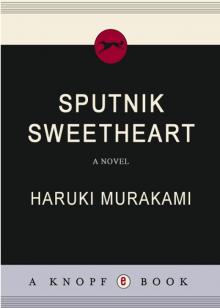 Sputnik Sweetheart
Sputnik Sweetheart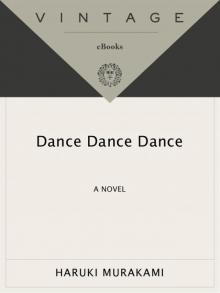 Dance Dance Dance
Dance Dance Dance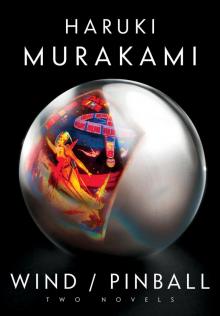 The Wind (1) and Up Bird Chronicle (2)
The Wind (1) and Up Bird Chronicle (2) Blind Willow, Sleeping Woman
Blind Willow, Sleeping Woman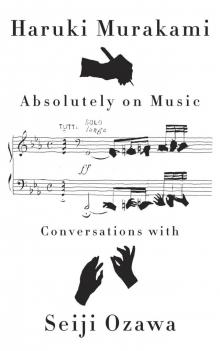 Absolutely on Music: Conversations With Seiji Ozawa
Absolutely on Music: Conversations With Seiji Ozawa Norwegian Wood
Norwegian Wood South of the Border, West of the Sun
South of the Border, West of the Sun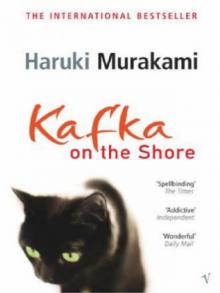 Kafka on the Shore
Kafka on the Shore Men Without Women
Men Without Women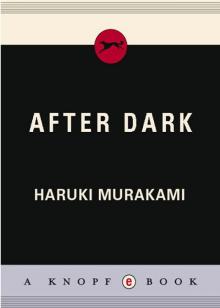 After Dark
After Dark Hard-Boiled Wonderland and the End of the World
Hard-Boiled Wonderland and the End of the World 1q84
1q84 The Wind-Up Bird Chronicle
The Wind-Up Bird Chronicle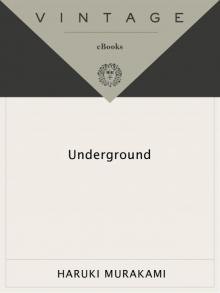 Underground: The Tokyo Gas Attack and the Japanese Psyche
Underground: The Tokyo Gas Attack and the Japanese Psyche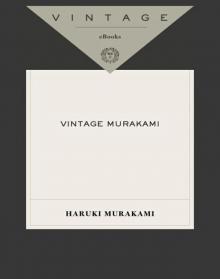 Vintage Murakami
Vintage Murakami The Elephant Vanishes: Stories
The Elephant Vanishes: Stories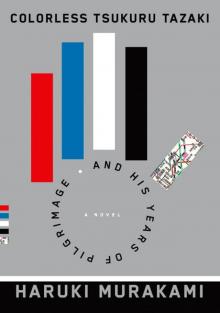 Colorless Tsukuru Tazaki and His Years of Pilgrimage
Colorless Tsukuru Tazaki and His Years of Pilgrimage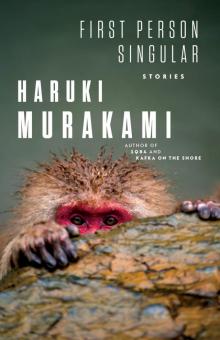 First Person Singular
First Person Singular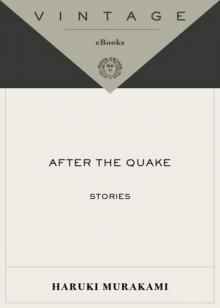 After the Quake
After the Quake A Wild Sheep Chase
A Wild Sheep Chase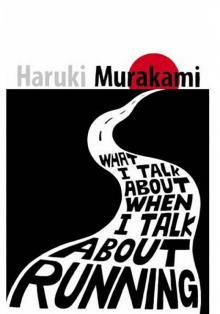 What I Talk About When I Talk About Running
What I Talk About When I Talk About Running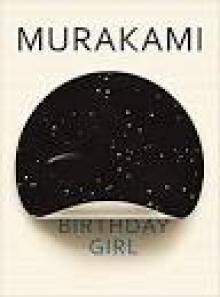 Birthday Girl
Birthday Girl The Elephant Vanishes
The Elephant Vanishes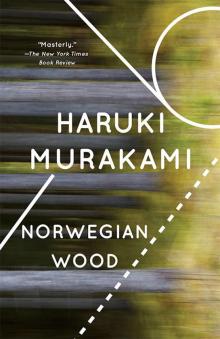 Norwegian Wood (Vintage International)
Norwegian Wood (Vintage International)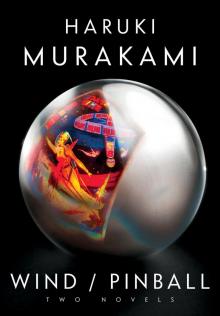 Wind/Pinball
Wind/Pinball Norwegian Wood Vol 1.
Norwegian Wood Vol 1. Underground
Underground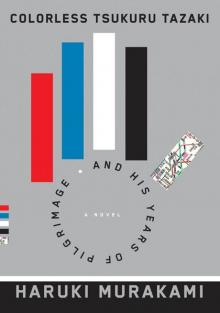 Colorless Tsukuru Tazaki and His Years of Pilgrimage: A novel
Colorless Tsukuru Tazaki and His Years of Pilgrimage: A novel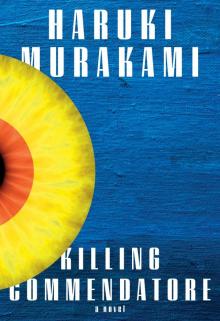 Killing Commendatore
Killing Commendatore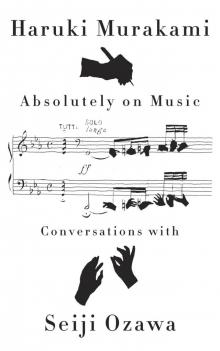 Absolutely on Music
Absolutely on Music